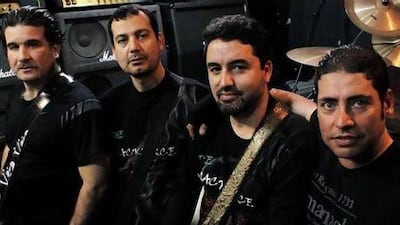It is something more than a phone call. Then again, it is something more than a story.
The members of The Blackforce are gathered in a guitar shop in Tripoli, the Libyan capital.
“It’s the only professional one in the city,” says Adel Toumiya, the bassist. The band is in what they call “training” for what they hope will be a busy spring and summer of recording and live performances.
The four musicians look twice the age of most heavy metal heads because, well, they are all in their 40s, all holding down careers, all in their fourth or fifth attempt at doing what metal heads in western countries take as their birthright – playing live for leather--jacketed longhairs who want the -decibel-driven buzz of rock’s -juvenile-delinquent kid brother.
The interview is more than a phone call because it’s via Skype – it’s too expensive and the connectivity is too poor to call on a mobile phone from New York. At least the Skype connection is decent.
“Back then, in an international study, our internet connection to the world was considered ‘0 per cent’. It’s better now,” Toumiya says.
“Back then” refers to the time of Muammar Qaddafi, who ruled Libya with an iron fist and gaudy ceremonial garb for 42 years until Misurata rebels overthrew and killed him in 2011.
“I want to tell you about the 1980s,” Toumiya says. “Qaddafi considered western music outside of our culture. So, in 1984, his soldiers burnt all the western instruments. The country stopped hearing that music.”
Not entirely so. Formed in 1985, sundered a half-dozen times since then by governmental pressure and the resulting absence of venues or the simple freedom to play, the members of The Blackforce fed their appetite by having friends bring them LPs from Europe.
“Deep Purple, Black Sabbath, Iron Maiden, Metallica, Megadeth, whatever we could get. But we have our own style,” says Toumiya. “We have something special, just for us.”
In 1987, the band “trained” and played for an engineering faculty at the University of Tripoli.
“We had just started when Qaddafi’s soldiers came in and cut the electricity. We suffered as musicians under the regime. We could not play for the people. It was not allowed,” says Toumiya.
In 1990, they tried again. “But we had to stop again, there was no protection from the government and [the music industry].” Indeed, artists were expected to write songs about Qaddafi or his regime. “And there were no places to play. We were underground. We played together, but not in concerts.”
“It was not easy but we did it,” says Nasir Algeedi, the band’s vocalist and rhythm guitarist. “But it was not 100 per cent legal.”
So they played at house parties and college gigs and the odd club. “But we were the first. And still the biggest, I think.”
Toumiya struggles for the right words in English: “So many things I’m trying to [express]. You couldn’t be political. It was dangerous for you. We had friends who went to prison. He didn’t want stars, especially in sports and arts, things like that.”
I suggest that only Qaddafi was permitted to be a star, and the room explodes in laughter.
“Yes!” Algeedi erupts.
They did not play together consistently for 26 years. Playing outside of Libya was even more notional than playing at home, so they never did.
Meanwhile, life went on and the four musicians made their living: Algeedi runs a textile business; the lead guitarist Jalal Al Turki has a printing company; Salah Khwildi, the drummer, works in Libyan music TV and Toumiya is a teacher.
“You know, Mark, we have big hopes,” Toumiya says. “And we are starting once again, God help us. We are middle-aged.”
Not too old to rock ’n’ roll? “How old are you?” he asks. Point taken.
After the February 17 revolution in 2011 came seismic change. A hip-hop group called FB17 emerged in Misurata early that year with an emphatically politicised song in Arabic and English, No More Lies, which became a hit in the rebel enclave. Toumiya had heard of them.
Unfortunately, a garbled email exchange with the FB17 guitarist Mohamed Jibril, nicknamed Haq, revealed that the band “is finished”.
But there will be more bands. The internet works, which means more music.
“Now, on the internet, you can find anything,” Toumiya says.
Things are not perfect, though. “It seems like there’s some sort of freedom. But it’s still difficult.” The Blackforce are signing deals to play at festivals beyond Libya’s borders. Khwildi now even owns a Ludwig Limited Edition stainless steel drum kit signed by Led Zeppelin’s John Bonham.
“We sensed the possibility of freedom [after February 17],” says Toumiya. “We began another stage. Before, in the streets, you could be shot. There are no guns in the streets now. We hope in six months or a year, there will be another leader and everything will be OK.”
The other real laugh in our conversation comes when I ask if the band would like to play in the US or Canada.
“Why not?” Toumiya exclaims, smiling at the seeming absurdity of a Libyan band playing in New York.
The connection breaks for a few seconds, then locks back in. Toumiya hoists his computer and pans around the music shop like a cameraman, giving me a “tour” of the interior: the walls are lined with Fender and Ibanez and ESP electric guitars and there are Marshall amps on the floor.
The Blackforce only use Marshall amps and Ludwig drums because, well, what could be more rock ’n’ roll?
“Do you see?” Toumiya asks.
I do. In my mind’s eye, I see the guitars that were burnt in 1984. “But now,” Toumiya says, “we are burning again.”
Follow us
Follow us on Facebook for discussions, entertainment, reviews, wellness and news.

